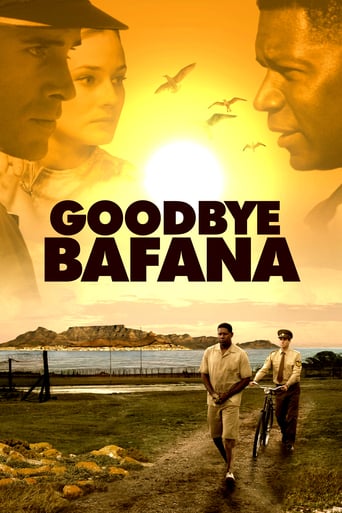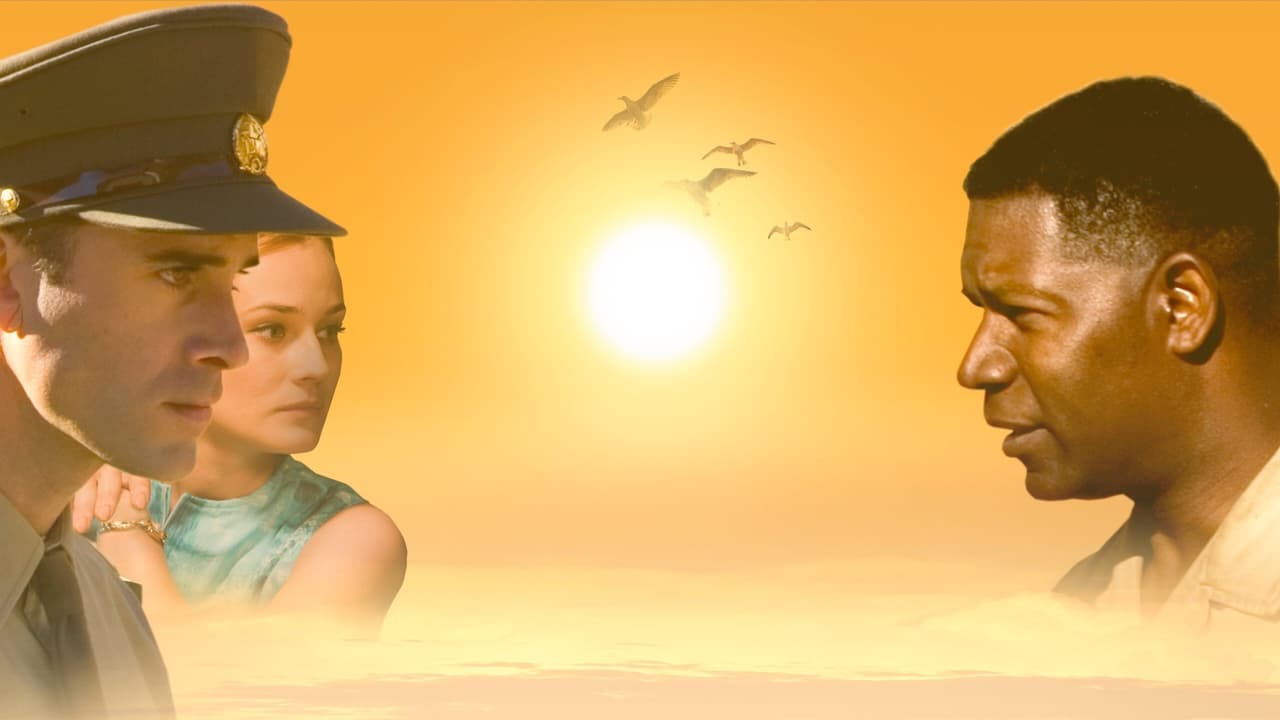SnoopyStyle
James Gregory (Joseph Fiennes) with language skills is recruited as the censor officer to watch over prisoner Nelson Mandela (Dennis Haysbert). His wife Gloria (Diane Kruger) is eager for the promotion. He is a true believer in fighting the African communists and would prefer to have Mandela hung for treason. His childhood on a farm and friendship with native boy Bafana had taught him the languages. James starts to see problems with the oppressive apartheid system and becomes an advocate for Mandela's rights.By all accounts, James Gregory was a professional jailer and a kind one as much as they were allowed to be. I don't see any big problems with some minor tall tales. There may be some history police coming for this. The movie faces bigger problems. James Gregory could never face more danger than the situation for other people during this time. It feels minor by comparison no matter how much the movie pumps it up. Haysbert is a solid Mandela. He doesn't have the look but he does have the presence. Joseph Fiennes is a great actor and a solid lead here.
johnnyboyz
Seems quite sad that the true-to-life character of Nelson Mandela would be reduced to a supporting character in a film about him; his stay on the Robben Island prison and his consequent release in the 1990s. Truth is, Bille August's 2007 film has a head and a heart in two different places; his film more closely resembling the sort of thing your bog-standard GCSE teacher might slap on for the students in class, before nipping out for a quick cigarette, during the week that sees the school syllabus demand South African Apartheid era be studied. But despite all this, it didn't bother me as much; the film observing the changing attitudes of a prison guard on the aforementioned island jail and using him as an example of which the greater changing attitudes of a nation at that time are templated. Yes, it resembles a TV movie of the week and yes, at about the half way mark you can envisage the film's final few moments consisting of a little white text caption coming into focus on the black background detailing what the lead character's current state is; but above all this is a film wanting to tackle a white individual's guilt rather than a black individual's plight and with this established pretty early on in the film, I did not have a problem with the direction the film took.Goodbye Bafana revolves around a pro-white; pro-Apartheid guard with the South African prison service named James Gregory, played by Joseph Fiennes, who moves to Robben island with his family of wife Gloria (Kruger); young son Brent and daughter Natasha in the 1960s. James is a censor officer, cutting out words and sentences from inmates' letters and having the authority to listen in on conversations inmates have with their visitors; cruelly cutting them off if he deems it fit to do so in that they break the house rules. The very first scene is the family shipping themselves off to the island, a sense of life beginning at this point. James is the focus here, his family relegated to mere items of viewership with the children playing roles that see them ask the questions that ill-informed on Apartheid audience members will be asking; Diane Kruger, the relatively talented actress, not given anything to do bar be relegated into playing the role of the token fascist whose racial tidbits sum up an entire mindset of an era. "Why are the blacks prisoners on the island?" asks Brent; "Because they're terrorists who want our land." replies Gloria, in a fabricated and false manner. Then we remember this is playing to GCSE students whom are unfamiliar with the subject and it is they who are asking with the programmed response kicking in.James is the bridge between a shallow, vacuous existence in his wife's-plus-her friends' empty existence on the island and the gruelling, grotty prison set life of a number of imprisoned blacks whom it is deemed are enemies of the state. One of these is the aforementioned Nelson Mandela, played here by Dennis Haysbert, who does a reasonable job shuffling from scene to scene and keeping a stern and expressionless face in playing the man; although the level of the performance cannot be understated when we recall what it is Haysbert is exactly required to do: essentially playing a dispirited prisoner throughout and given little room to play the equality driven saviour of a nation and its beliefs.Interestingly, the moment that encapsulates the very sentiment that the film is more interested in Gregory's tale than Mandela and his struggle and the manner in which he went about doing what he did actually occurs very late on, but it's telling all the same; in a sequence that sees Mandela and his assistants sit around a large table about to indulge in the sorts of discussions that saw them do what they did but sees James leave the room with the film following him, just as those at the table appear to get started, so as to cover his moving house and his family problems. Akin to this is James' gradual arc of realisation, something that's satisfying in its very basic observation; the man's past life experience in knowing a young black boy in his youth proof he was once able to connect with blacks in a friendly manner with moments such as the reading of some kind of Mandela written equality charter just foreshadowing the obvious. As the years roll on and everyone grows older, the Gregory's shift around and Mandela himself is kept on the sidelines as he changes prisons looking at the main strand of the film from a distanced perspective. It's a situation akin to John Boorman's 2005 film Country of My Skull (In My Country, to Americans), when the plight and strife of oppressed South Africans and their justice is given the odd glance in tangent to a Caucasian individual or individuals and their relationships with other Caucasians around them plus whatever hardships they suffer with their employers. It isn't reason enough to hate the film, but it's reason enough to get a little flustered provided you can identify the niggling frustrations and work around them so as to enjoy the film as it stands. The film tries to provide some dramatic tension to proceedings, the arrival of a new and more brutal Robben Island chief of staff later on in life supposed to instill a sense of what might happen if Gregory were to be caught by this new chief as his attitudes begin to change. Goodbye Bafana was made with the best of intentions, achieving what it sets out to do with relative dramatic and respectful aplomb, but one cannot argue that it all too often feels like a low-key retelling of events for those naive to the subject matter.
Boromir28
I had great expectations for this movie as Nelson Mandela is by far the most important political figure of our age(second perhaps only to Ghandi), and as such he deserves every bit of homage that can be sent his way."Goodbye Bafana" should have been the paramount praise for this extraordinary man, yet it never reaches the potential that lurks just beneath the surface.One reason for this is the fact that the time frame that has to be covered is too big for the time set aside telling it. As a result, the movie jumps from episode to episode or from highlight to highlight because every aspect of the two men has to be told. This way of telling the story leaves the characters under developed and rather one dimensional. Especially the change in Gregory (Fiennes)from bigot to humanitarian seems to happen overnight. The leading men are excellent as the prisoner and the guard, but the pace of the movie is too fast and does not give time to delve into the relationship, because there are so many events that have to be covered.The movie receives 5 stars for the acting and the settings, the direction prevents it from achieving greatness.
antoniotierno
This film, based on two very important men, is emotional and sincere but overall it is believable, every single moment is significant and told gracefully. A real life movie based is supposed to be precise without getting too much into detail - otherwise it turns boring - and so is "Goodbye Bafana", documenting 27 years in the life of this prison guard. Things and events described in the motion picture heat up gradually, the leading actors are simply outstanding so that the two hours runtime seems much shorter than it is. Haysbert is terrific, even more than Fiennes and they're both superb for their parts, with them each moment becomes increasingly more touching


 AD
AD




